Key Difference – State Actors vs Non-State Actors
International actors can be mainly classified into two categories: state actors and non-state actors. The main difference between state actors and non-state actors is that state actors are the ruling governments of a state or country, while non-state actors are influential organizations or individuals with the potential to influence the actions of state actors, but not affiliated with a state.
Key Takeaways
- State actors are the governments of countries and have the ultimate authority in their decision-making process, as well as the right to possess military power.
- Non-state actors are organizations or individuals that have the political, economic, or social capability to influence at a national or sometimes even on an international level, but are not affiliated with any government or state.
- Globalization and technological advancements have increased the capacity of non-state actors to influence and challenge the actions of state actors.
What are State Actors?
A state is defined as the political unit that has ultimate authority or sovereignty over a specific area of territory and its people. In other words, state actors are the governments of countries around the world. Examples of state actors include the USA, UK, China, Germany, France, Vatican state, and Singapore. They are the major and dominant actors on the international stage, holding administrative power of a state and possessing the legal right to use force and military power at their discretion.
What are Non-State Actors?
Non-state actors are all entities that are not government-affiliated. They are lower in the power hierarchy than state actors and do not have the legal right to use military force and power as state actors do. However, in cases of inter-governmental organizations (IGOs) and non-governmental organizations (NGOs) involvement in state affairs, such as UN peacekeeping forces, military force is used under the approval and consent of the particular state.
Non-state actors can be organizations or influential individuals that have the capability to influence at a national or international level. They are not affiliated with any government or state, which allows them to work individually and influence and interfere with the actions of state actors.
Non-state actors can be further divided into sub-state actors, IGOs, transnational actors, violent political groups, criminal groups, and influential individual figures.
What is the Relationship Between State Actors and Non-State Actors?
State actors and non-state actors interact with each other in the international arena, and international relations is the study of their interactions and their consequences.
What is the Difference Between State Actors and Non-State Actors?
State actors are the states or governments of countries, while non-state actors are groups or individuals who have the potential to influence the activities of state actors. State actors primarily consist of states, while non-state actors can be IGOs, NGOs, transnational actors, violent political groups, criminal groups, and influential individual figures. State actors have state-related interests, as exemplified by their domestic and foreign policies, while non-state actors have varied self-motivated interests.
Summary – State Actors vs Non-State Actors
International relations deal with studying how state actors and non-state actors interact with each other. Globalization and technological advancements have transformed the international order, leading to non-state actors becoming major players in the international arena alongside state actors. As a result, the actions of state actors are often influenced and challenged by the growing demands of non-state actors. The difference between state actors and non-state actors is that state actors are the ruling governments of states, while non-state actors are influential bodies not affiliated with states. The interests of these actors differ accordingly.
